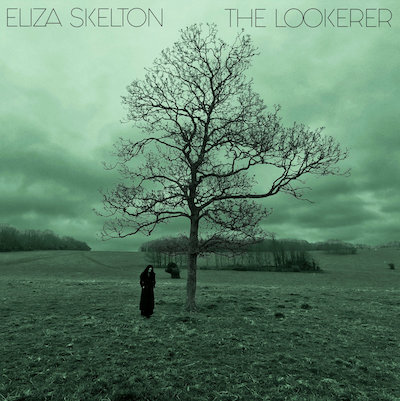Eliza Skelton
The Lookerer
Blue Matter Records
2023

Eliza Skelton is a Brighton-based singer-songwriter and accomplished multi-instrumentalist who’s been quietly beavering away on the south coast scene for several years, making music, albeit mostly in the ambit of other musicians, notably The Desperate Ones (in tandem with Paul Simmons) and the band Oddfellow’s Casino. And, of course, as co-protagonist (with Oddfellows’ head honcho David Bramwell) of the mightily irreverent fun show Sing-Along-A-Wicker-Man!, which has to be experienced to be believed…
But now, at last, Eliza’s stepped fully out of the shadows to release an entrancing solo album which showcases her special brand of songwriting while deriving much kudos and artistic credibility in benefitting from her stint with Oddfellow’s Casino, whose assured, genre-bending musical exploits have clearly inspired her writing. The Lookerer is a confident collection of nine songs (all but one self-penned) that explore often heady, intense emotions through immersion in nature through gently epic, visionary lyrics. The musical climate inhabited by the album is atmospheric, almost filmic, folk-rock with touches of folktronica and goth. Eliza’s sound world is lush and more than mildly voluptuous, the musical settings softly rich; her vocal work is firmly poised and quite gorgeous, sometimes almost trance-like in its effect.
The title of this collection references a local Sussex Downs tradition. The term “lookerer” (ostensibly an abbreviation for “looker-after”) refers to a self-employed countryman who lived out on the Downs for much of the year looking after the grazing animals of several different farms. Since their work covered many miles of territory, they often, of necessity, camped wild under the stars. This sense of space, the sheer expanse of the open-downs, fairly pervades Eliza’s creative spirit, and this characteristic is firmly in evidence on the gently undulating contours of the album’s title song, marking time with its juxtaposition of watchful reality and unavoidable transformation. This almost dreamlike progression of events is vividly conveyed by the music’s shimmering, layered violin backdrop (Nick Pynn), evoking the wheeling gulls in the fog-bound seascape where the Lookerer waits out the sun until “the sea is gold”.
There’s a similarly powerful sense of expansive space on the album’s opening song, Above Whitehawk Hill (this being a local Nature Reserve on the South Downs), whose lyric imagines Eliza’s out-of-body experience while communing with her mother.
The animated, busy rhythmic percussive figures of One Daughter convey the process and experience of growth of seed and bird; this track sports an attractive antiphonal vocal arrangement featuring four backing singers (Hilary and Sam Skelton, Gabi & Ella Woollgar). For much of the album, though, Eliza provides her own multitracked, reverberant vocal echoes, as on the swooning, devotional Laika (referencing the Russian dog that died in space on the ill-fated 1957 mission), whose lyric marries the cosmic and the deeply personal and comes to rest on a whispered, chanted litany of obscure Russian names.
Just before the album’s midway point, the listener is plunged into a soundscape generated by the call of the curlew, one of the most distinctively evocative of all birds. On Curlew, Eliza sings of the bird’s flight and its reaction to the air and the trees, to an insistently thrumming, driving musical backdrop with freewheeling violin cascades (Simon Walker) that blossoms into a full-on 70s-style electric-prog freak-folk wig-out featuring some fine heavy-duty guitar work (Paul Simmons, Jordan Woollgar).
When this finally abates, we’re immersed in a tunnel of birdsong in a strange state of displacement, awaiting the arrival of Eliza’s voice to intone the poised, lonesome sentiments of O Willow Waly. This is a pivotal and memorable experience for the listener and, it transpires, the album’s only non-original item (it’s credited to George Auric & Paul Dehn). In its original form, this eerily childlike waltz was all-pervasive when used as a recurring motif in the 1961 cult psychological horror movie The Innocents (itself based on the Henry James ghost story The Turn Of The Screw, and directly forward-inspiring the mini-series The Haunting Of Bly Manor). Eliza’s treatment of this piece is cradled deep in an ominously tolling fuzz-guitar cocoon.
This subsides into Serenade Of Rough Music, where Eliza explores contrasting perceptions of forces of nature and the dereliction and devastation of encroaching wasteland into the city – this being reflected in the encroachment of discordant jazzy brass (trumpet and sax) interjections – before finally invoking a comparison with the concept of the river of song that flows forsaken through this wasteland. Into this scene trips The Time Traveller, dreamlike on a gossamer thread of delicate guitar, synth and vibraphone. Finally, on the languid, spacey closing song We’re The Wild Dogs, Eliza brings us the aromatic wishfulness of a singular kind of déjà-vu, which builds into a kind of anthemic chorale.
The Lookerer is a haunting and beguiling, if at times slightly enigmatic, album that entrances with its excitingly lush sound world, in which Eliza’s assured yet gentle and mysteriously captivating voice binds the disarmingly otherworldly vibe of the musical settings with the down-to-earth mysticality of her lyrical and philosophical vision.
